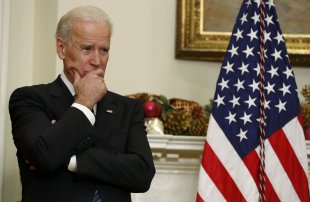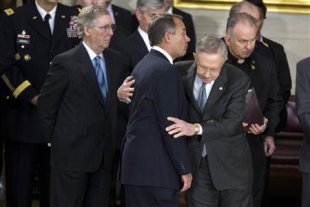WASHINGTON (Reuters) - President Barack Obama and congressional Republicans looked ahead on Wednesday toward the next round of even bigger budget fights after reaching a hard-fought "fiscal cliff" deal that narrowly averted potentially devastating tax hikes and spending cuts.
The agreement, approved late on Tuesday by the Republican-led House of Representatives after a bitter political struggle, was a victory for Obama, who had won re-election on a promise to address budget woes in part by raising taxes on the wealthiest Americans.
But it set up political showdowns over the next two months on spending cuts and on raising the nation's limit on borrowing. Republicans, angry the deal did little to curb the federal deficit, promised to use the debt ceiling debate to win deep spending cuts next time.
"Our opportunity here is on the debt ceiling," Republican Senator Pat Toomey of Pennsylvania said on MSNBC, adding Republicans would have the political leverage against Obama in that debate. "We Republicans need to be willing to tolerate a temporary, partial government shutdown, which is what that could mean."
Republicans, who acknowledged they had lost the fiscal cliff fight by agreeing to raise taxes on the wealthy without gaining much in return, vowed the next deal would have to include significant cuts in government benefit programs like Medicare and Medicaid health care for retirees and the poor that were the biggest drivers of federal debt.
"This is going to be much uglier to me than the tax issue ... this is going to be about entitlement reform," Republican Senator Bob Corker of Tennessee said on CNBC.
"This is the debate that's going to be far more serious. Hopefully, now that we have this other piece behind us - hopefully - we'll deal in a real way with the kinds of things our nation needs to face," he said.
Obama urged "a little less drama" when the Congress and White House next address thorny fiscal issues like the government's rapidly mounting $16 trillion debt load.
The fiscal cliff showdown had worried businesses and financial markets, and U.S. stocks soared at the opening after lawmakers agreed to the deal.
The Dow Jones industrial average surged 262.45 points, or 2.00 percent, at 13,366.59. The Standard & Poor's 500 Index was up 29.79 points, or 2.09 percent, at 1,455.98. The Nasdaq Composite Index was up 77.45 points, or 2.57 percent, at 3,096.97.
The crisis ended when dozens of Republicans in the House of Representatives buckled and backed a bill passed by the Democratic-controlled Senate that hiked taxes on households earning more than $450,000 annually. Spending cuts of $109 billion in military and domestic programs were delayed only for two months.
Economists had warned the fiscal cliff of across-the-board tax hikes and spending cuts would have punched a $600 billion hole in the economy this year and threatened to send the country back into recession.
RELUCTANT REPUBLICANS
House Republicans had mounted a late effort to add hundreds of billions of dollars in spending cuts to the package and spark a confrontation with the Senate, but it failed.
In the end, they reluctantly approved the Senate bill by a bipartisan vote of 257 to 167 and sent it on to Obama to sign into law. "We are ensuring that taxes aren't increased on 99 percent of our fellow Americans," said Republican Representative David Dreier of California.
The vote underlined the precarious position of House Speaker John Boehner, who will ask his Republicans to re-elect him as speaker on Thursday when a new Congress is sworn in. Boehner backed the bill but most House Republicans, including his top lieutenants, voted against it.
The speaker had sought to negotiate a "grand bargain" with Obama to overhaul the U.S. tax code and rein in health and retirement programs that will balloon in coming decades as the population ages.
But Boehner could not unite his members behind an alternative to Obama's tax measures.
Income tax rates will now rise on individuals earning more than $400,000 and families earning more than $450,000 per year, and the amount of deductions they can take to lower their tax bill will be limited.
Low temporary rates that have been in place for the past decade will be made permanent for less-affluent taxpayers, along with a range of targeted tax breaks put in place to fight the 2009 economic downturn.
However, workers will see up to $2,000 more taken out of their paychecks annually with the expiration of a temporary payroll tax cut.
The non-partisan Congressional Budget Office said the bill will increase budget deficits by nearly $4 trillion over the coming 10 years, compared to the budget savings that would occur if the extreme measures of the cliff were to kick in.
But the measure will actually save $650 billion during that time period when measured against the tax and spending policies that were in effect on Monday, according to the Committee for a Responsible Federal Budget, an independent group that has pushed for more aggressive deficit savings.
(Additional reporting by Susan Heavey and Richard Cowan; Editing by Jackie Frank)















